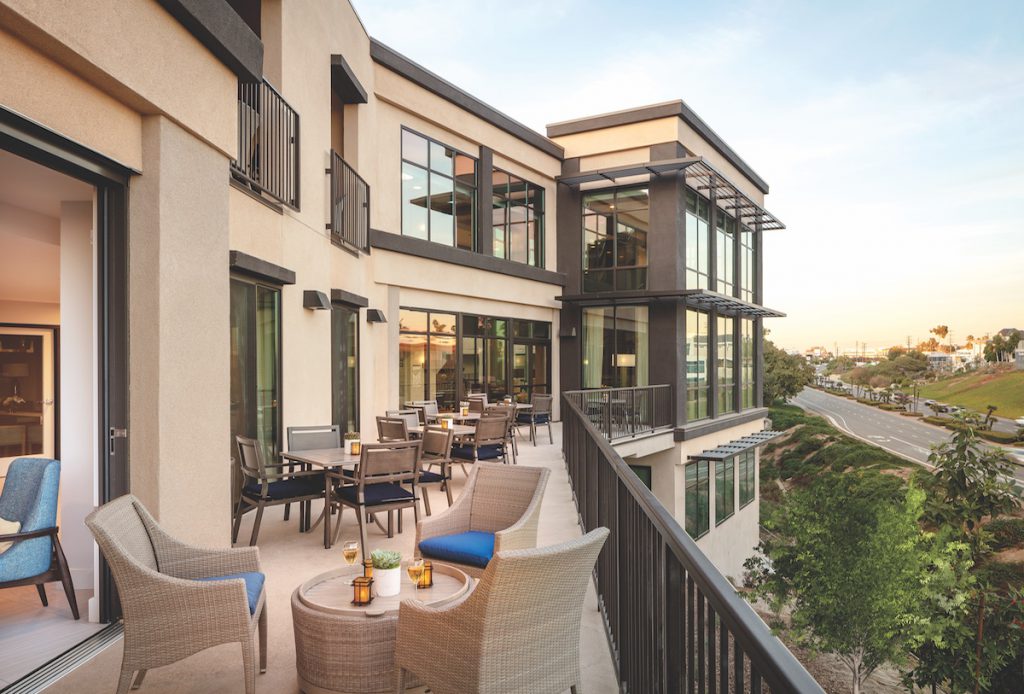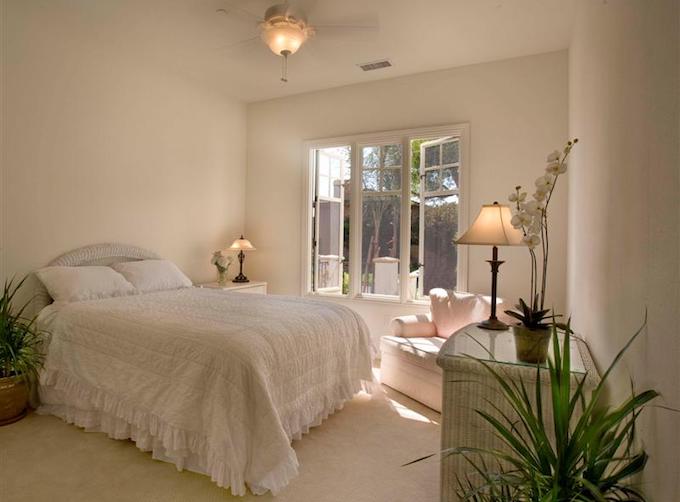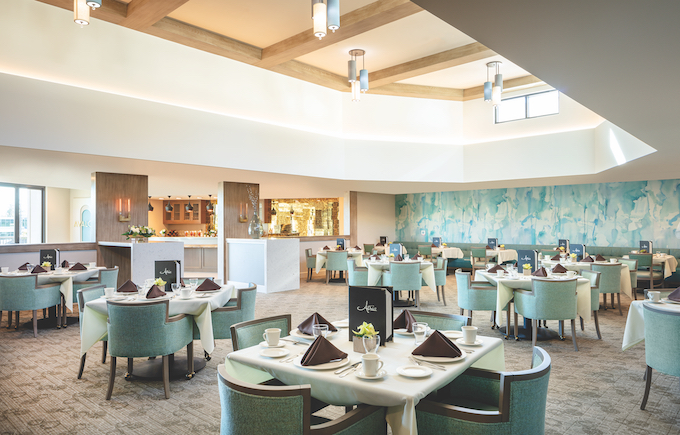
The pandemic and new technology have changed the way communities for older residents are being built.
By Julia Clerk
The ongoing pandemic has affected every aspect of our lives, but senior living facilities have been particularly hard hit, due in large part to the age of residents and the fact that many suffer from underlying health conditions that make them extra vulnerable to the virus.
According to the Centers for Disease Control and Prevention, typical everyday life at senior living facilities—like group dining areas and other communal spaces and interaction, frequent social activities and shared transportation—also increase the risk of contracting COVID-19.
More than 800,000 Americans currently reside in some kind of assisted living community, according to data from the National Center for Assisted Living. They range from smaller board-and-care homes to larger centers; staff help residents with daily tasks like walking, bathing and getting dressed. After a median stay of about 22 months, approximately 60% of residents move to a skilled nursing center for a higher level of assistance.
And the population continues to age: The number of Americans who are 65 or older is expected to nearly double by 2050—to 83.7 million from 43.1 million in 2012—according to the U.S. Census Bureau. In fact, by 2035, those of retirement age will outnumber the country’s population of children. In light of this coming shift, the assisted living industry has realized that it’s crucial to learn from the pandemic and adapt accordingly.
Local Models
Upmarket senior facilities in the Newport Beach area range from small, locally owned residential models with a high level of physical assistance and cognitive care like Newport Senior Living to large resort community models like Atria Newport Beach, part of a corporation with 18,000 residents and more than 13,000 employees at over 200 locations in 28 states and seven Canadian provinces.
Newport Senior Living offers three purpose-built homes—with a fourth on the way—that can each house up to six residents.
“The small population, private bedrooms with en suite bathrooms, and large hallways, common areas and outdoor space allowed for social distancing that helped get the homes through the worst of the pandemic,” explains Bruce Winstead, owner and president of Newport Senior Living, noting that the company also strictly adhered to sanitization procedures already in place in addition to new state guidelines when COVID-19 hit. As soon as the rules allowed, abundant patio and other outdoor space enabled socially distanced family visitations, as long as safety protocols were followed; now, visitation inside the homes has been restored as long as masks are worn. Also, proximity to neighborhood parks helped expedite resident exercise and well-being during quarantine.
Another option, offering both independent and assisted living as well as memory care, the new high-tech Atria Newport Beach boasts a total capacity of 185 residents in 165 apartments. Given the fact that it officially opened in February 2021—with the first residents moving in the previous month—it avoided the worst of the pandemic. However, that’s not to say that lessons learned elsewhere didn’t come into play.
“The pandemic changed our day-to-day life drastically,” says Atria Newport Beach Executive Director Ben Rodney. “Our staff wore PPE and continue wearing masks. We all stayed home more than ever before. And our residents were not able to dine together as planned. For our staff and residents, the biggest change was choosing not to see family for holidays or birthday celebrations because the priority is keeping everyone in our community here and in Newport Beach safe.”

Lessons Learned
Without doubt, the pandemic’s effect on other senior living facilities had a huge impact on how Atria Newport Beach was planned and designed. “It’s the most technology-forward and pandemic-ready community for seniors,” Rodney says.
For instance, it offers “contactless” visiting areas as well as socially distanced, open-air spaces to allow for safer family visits, as well as abundant tech amenities for safety and convenience.
“Technology and its adoption have proven to be the leading innovation from the pandemic to be more connected, to create touchless environments and to build ways to know more faster,” he adds.
Atria Newport Beach even has a digital innovation director, Dori Redman, whose singular mission is helping residents understand and use technology that can make their lives safer, easier and more comfortable.
The company calls the Atria Mobile app the cornerstone of its care program going forward. To date, more than 8,000 families and residents have downloaded the app nationwide. Residents are issued wearable technology linked to the app, which includes features like real-time monitoring of possible symptoms, handheld home automation and telemedicine support, as well as touchless entry to their apartments. The wearable technology can also allow for contact tracing if there is a COVID case.
And Rodney says the mobile app opens a window into day-to-day life by providing daily dining menus, the facility’s Engage Life program schedule and regular community updates. Family members can also log on to view real-time information on health monitoring of residents and discover what activities they are participating in.
“Our residents have embraced technology,” Rodney says. “They have lived through the greatest technology advances in the history of mankind, so they are incredibly curious about the many ways we apply new tech. It’s amazing to see them smile when their wristband flashes green and their apartment door opens for the first time.”
Joan Cox, one of Atria Newport Beach’s first residents, approves of the technology. “The most useful tech here is the wearable device on our wrists,” she says. “It makes everything easier—from opening my apartment door to calling for assistance when I need. It’s great with the care team and I can speak directly through my wrist device.”

Social Interaction
Beyond physical health and safety, another huge lesson learned during the pandemic is the importance of social interaction.
“Life changed for everyone during the pandemic,” Cox says. “The most difficult aspect for me was seeing my family much less than before. The Atria Newport Beach staff worked with me and my family to make patio visits happen, and I can’t be happier since we’ve started letting loved ones back into our apartments to visit.”
“Residents will not be healthy if they are completely isolated from family and other residents,” Winstead adds. “If a resident is not healthy mentally, it will usually impact physical health as well. Communication and interaction is important mentally and we’ve learned from the pandemic that balance is important. You’ve got to be safe, but you also have to meet the emotional needs of your residents.”
Rodney agrees. “This isolation for seniors is antithetical to the fact that human connection is absolutely vital to well-being. … People belong together, and senior communities provide this essential social environment,” he says. “We found new, creative ways to come together, both virtually and socially distanced. We had conference call book clubs, themed food and beverage carts and guided meditation.”

Looking to the Future
Now that the worst of the pandemic appears to be over, senior facilities can resume many of the activities designed to keep residents active and entertained. As of May, 93% of Atria’s U.S. residents and staff had been vaccinated.
Atria’s signature events and activities program—Engage Life—is ramping up again with daily opportunities for residents to engage in creative projects, connect with each other and get out in nature, all while having fun and staying fit. The program includes everything from art, games and ballroom dancing to volunteering and charity work.
Among its other amenities, Atria Newport Beach boasts a salon and spa, fitness center, movie and lecture hall, as well as access to chauffeurs and a variety of dining options.
A much more intimate facility, Newport Senior Living will continue to foster a high caregiver to resident ratio. That translates into one caregiver to every two or three residents, with three eight-hour shifts, meaning staff are available 24 hours a day for residents who want or need a higher level of physical assistance and cognitive support.
It also offers highly personalized individual activity plans for each resident that might include, for example, Bible study, games, movie nights, walks in the park or chair exercise programs, as well as personalized menus to meet specific diet requirements.
Although the COVID-19 pandemic will go down in history as one of the nation’s greatest challenges, the senior living industry will be able to reflect on this moment as a time when real and lasting changes were made to enhance the health and happiness of residents both in Newport and across the country.




